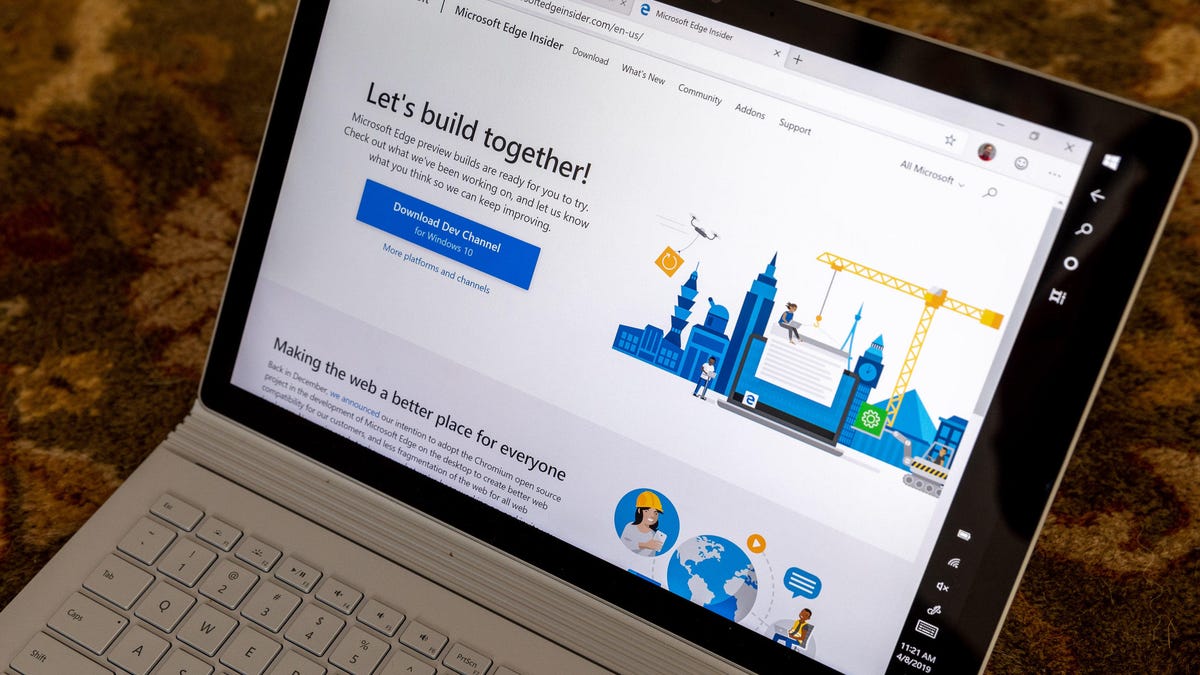Microsoft Edge browser will block intrusive ads
Blocking ads and protecting privacy are becoming points of competition among browsers.

Microsoft's Edge browser is built on Chromium, the open-source underpinnings of Google's Chrome.
Microsoft's Edge browser will block ads that are deemed too intrusive, a new sign that browsers have begun competing to make the web better for you even if businesses might not like it. It's a significant development for Microsoft's new Chromium-based Edge, an overhauled app now available for Windows, MacOS, Android and iOS that's based on Google's open-source browser technology.
"We're a member of the Coalition for Better Ads. As part of that we plan to start enforcing these standards by blocking ads on sites which do not comply with CBA guidelines by default," Kyle Pflug, Edge project manager, said in a Reddit ask me anything discussion. Those guidelines preclude ads that are too intrusive or distracting but doesn't do anything about a separate cost of ads, tracking technology that can invade your privacy .
The Edge move mirrors the approach to ad blocking that Google Chrome began in 2018. Edge will go a step further, though: Microsoft previewed a Edge privacy control that you could use to block advertisers and publishers from tracking you across the web. It'll offer three levels of tracking constraints, unrestricted, balanced and strict.
Gone are the days when browsers would do whatever website programmers told them to. Increasingly, they're blocking ads, blocking ad trackers, and blocking sneakier website code that mines cryptocurrency to make somebody else money or fingerprints your browser for more surreptitious tracking.
That can pay off with faster page loading and better privacy -- and now browsers have begun to compete on these features. Free, ad-supported websites may not like it, but it's becoming the norm.
Shift toward ad and tracker blocking
The Brave browser blocks all ads and trackers by default today, Safari blocks trackers with an approach called Intelligent Tracking Prevention, and Mozilla just enabled tracker blocking by default in Firefox. Chrome has taken some measures to curtail the cookies that can be used to track you online, too.
Edge won't go as far as Brave by blocking all ads, though -- at least as currently planned.
"For most users, we find that extensions (combined with strong defaults around tracking prevention) are the best option here because you can choose from a variety of experiences and defaults, but we absolutely want to hear from you if you think this should be built in," Pflug said.
Microsoft didn't immediately respond to a request for comment.
Millions of us already block ads and trackers with extensions that plug into browsers. Google is in the midst of a controversy with an effort to rein in extensions, though, because the technology also impairs content blocking.
Following Chrome's extensions decision?
In the AMA, several people asked whether Microsoft would follow Chrome's example in constraining ad blockers. Brave, Opera and Vivaldi each have said they won't implement Google's change, but Microsoft is still evaluating its options.
"We are in ongoing discussions with a number of popular extension developers and with the Chromium community to understand both the technical merits and the impact to developers and customers of the proposed changes," Pflug said.
Advertising has been a boon to free, ad-supported websites that likely wouldn't have grown as fast or as far if they'd required subscriptions or other payments. But advertising has drawbacks, too, in particular privacy invasion from companies that want to track your behavior to target ads toward your interests or profile.
Browser makers are aware of the consequences of cutting off ads. Brave is trying to build an alternative, privacy-respecting system that today shows ads as notifications if you opt into the system. Mozilla also has some ad revenue from its bookmarking service Pocket.

